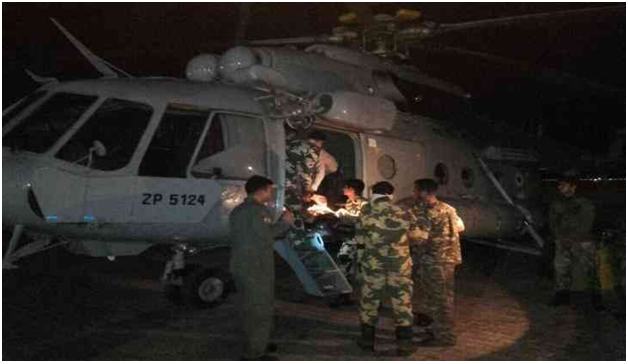"Sukma Repeat of Dantewada Mistakes, Solution Lies in the 5th Schedule For Tribal Rights": Former BSF Chief Rammohan

NEW DELHI: “The Central Police Reserve Force (CRPF) has made exactly the same mistake as they did in 2010 when 75 of their men and one head constable were massacred in Dantewada (2010) by the Maoists, clearly there has been no effort to learn from past mistakes,” said the outspoken former chief of the Border Security Force EN Rammohan who had been appointed by the Manmohan Singh government at the time to reconstruct the sequence of events leading to the dastardly attack.
In an inteview with The Citizen Rammohan said that the CRPF had made exactly the same mistake, and had moved into the territory without a Road Opening Party. Explaining this, he said that when a security contingent moves in known insurgent territory, it ensures that the distance to be covered is first cleared by the ROP. “Since manpower is not sufficient to cover the entire distance at a time, this is done in stages. ROP men flank the route for some metres or a kilometre at a time, and the rest move through the secured area. And the same procedure is adopted for the entire route, keeping the flanks guarded from possible ambush,” he said.
In Dantewada where almost a company strength of the CRPF was wiped out, and now again in Sukma in Chhatisgarh 25 were killed as they had not followed procedure, and were not on alert. Rammohan pointed out that his report and recommendations then were not implemented by the government as the CRPF found it too “harsh perhaps” but he had found a major dereliction of duty by the officers at the time. A standard procedure that troops should be made to follow when in hazardous terrain is not being followed.He had made specific recommendations but these in his view were ignored by the Union Home Ministry under P.Chidambaram then, and clearly no headway in implementing a basic SOP has been made now.
The former BSF chief who is conversant with the situation in both Jharkhand and Chhatisgarh said very clearly that apart from the technicalities, the situation would not improve until and unless the government implemented the Fifth Schedule of the Indian Constitution in letter and spirit. He said the ‘root cause’ of the issue has to be addressed, and this can only be if the Governor of a state is made to exercse his powers to administer the sensitive Adivasi belts in these states and ensure them rights and justice.
“It is not for the Chief Minister to decide affairs for the Adivasis, and for the Forest Minister to issue tenders for mining and forestry, it is for the Governors to implement the Fifth Schedule in favour of the oppressed Adivasis,” Rammohan said. He admitted that he was amongst the very few speaking of this issue today, “shocking and shameful” as he said, for the answer to the Maoist problem lies entirely in ensuring rights and justice for the Advisasis. He spoke of exploitation of these poorest of the poor tribes by the security personnel, administration and politicians asking, “then how do we expect them to have trust and confidence in us?”
“I was interviewed on the Sukma incident by any number of television channels but they did not want to hear about the plight of the Adivasis and the solution that lies in the 5th Schedule,” he said. He was also critical of representatives of some non-government organisations who were arrogant and ignorant according to the former BSF chief.
Naming a police officer in Chhatisgarh who was a favourite of the state government Rammohan describing him as a “shame on the Indian police service” said that the policy implemented through such persons ensured the harassment and victimisation of the Adivasis, and particularly their women.
Instead of addressing the ‘root cause’ the Chhatisgarh police has been given the license to attack civil rights activists and journalists working and reporting from the ground. The Editors Guild of India sent a fact finding delegation to Bastar following complaints of threats and harassment by several scribes, only to confirm this. The report regretted the pressure being brought upon journalists, who had been threatened directly by the police with many having to leave the state altogether for fear of their safety. Civil rights activists have been threatened, not just by the local authorities, but also by mobs and virtually driven out of the area with their demand for humane and just action for the tribals being dismissed by the authorities as “Maoist jargon.”
The Fifth Schedule covers the Tribal areas in 9 states namely Andhra Pradesh, Jharkhand, Gujarat, Himachal Pradesh, Maharashtra, Madhya Pradesh, Chattisgarh, Orissa and Rajasthan. Today the BJP is in power in seven of these. Essentially the Fifth Schedule is a guarantee to the tribals (indigenous) of the proscribed areas over the land they live in. In Chhatisgarh, for instance, the areas so defined include Sarbhuja, Bastar, Raigad, Raipur, Rajnandgaon, Durg, Bilaspur, Sehdol, Chindwada, Kanker where the struggle for land rights is being countered by a conglomerate of vested interests seeking control of the rich and abundant natural resources here.



